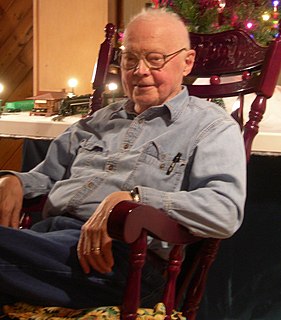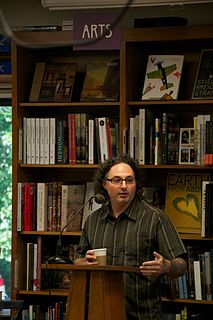A Quote by Deborah Lawrenson
I marveled at how they were all closed up, asleep with their secrets unseen until you reached up and took the book down from the shelf.
Related Quotes
You could tell from the books whether a library was meant for show or not. Books that were used had an open, interested feel to them, even if closed and neatly lined up on a shelf in strict order with their fellows. You felt as though the book took as much interest in you as you did in it and was willing to help when you reached for it.
The book of the moment often has immense vogue, while the book of the age, which comes in its company from the press, lies unnoticed; but the great book has its revenge. It lives to see its contemporary pushed up shelf by shelf until it finds its final resting-place in the garret or the auction room.
The best way to get kids to read a book is to say: 'This book is not appropriate for your age, and it has all sorts of horrible things in it like sex and death and some really big and complicated ideas, and you're better off not touching it until you're all grown up. I'm going to put it on this shelf and leave the room for a while. Don't open it.
Until I reached my late teens, there was not enough money for luxuries - a holiday, a car, or a computer. I learned how to program a computer, in fact, by reading a book. I used to write down programs in a notebook and a few years later when we were able to buy a computer, I typed in my programs to see if they worked. They did. I was lucky.
Me and a mate picked up two darling birds and they took us back to their flat. I went into the bedroom with my bird and she started getting undressed. I was that drunk I was standing there wondering how to get undressed without letting go of the award. I went to sit on the bed, missed it by four feet and ended up lying on the floor. I remember the bird looking down at me, and saying, ‘Some player of the year.’ Then I fell asleep. I woke up still clutching my award and staggered out of the flat. I hadn’t a bloody clue where I was.
What I am most proud of with the book On to the Next Dream is how I turned an intensely emotional experience into art. Anyone can run up to a rooftop, tear off their clothes, and scream about how screwed up the world is. But for the people down below, all they see is a person losing their mind. I wanted to make something that channeled that emotion in a way that elicited an empathetic response from the reader. So that after you read this book, you would want to run up to the rooftop and scream about how screwed up the world is.
People who are close to me know, they so know that there were days when I was so tired that I would fall asleep anywhere. The onset photographer has pictures of me falling asleep everywhere. Like on chairs, on the floor, in the middle of a set, all curled up. There were times when crew members didn't know where to find me, but they knew I'd be curled up in a ball somewhere.
I think, for the rest of my life, I shall refrain from looking up things. It is the most ravenous time-snatcher I know. You pull one book from the shelf, which carries a hint or a reference that sends you posthaste to another book, and that to successive others. It is incredible, the number of books you hopefully open and disappointedly close, only to take down another with the same result.
That’s how Ptolemy imagined the disposition of his memories, his thoughts: they were still his, still in the range of his thinking, but they were, many and most of them, locked on the other side a closed door that he’s lost the key for. So his memory became like secrets held away from his own mind. But these secrets were noisy things; they babbled and muttered behind the door, and so if he listened closely he might catch a snatch of something he once knew well.







































